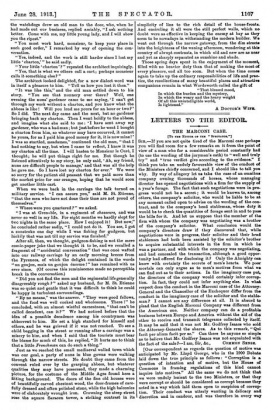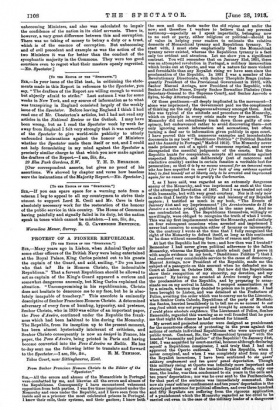LETTERS TO THE EDITOR..
THE MARCONI CASE.
[To THE EDITOR OF THI " SPZDTATOR."1
Sin,—If you are not quite tired of the Marconi case perhaps you will find room for a few remarks on it from the point of view of a man who for a considerable period constantly had (to use the wording of the juryman's oath) to " well and truly try " and " true verdict give according to the evidence." I think you take an unduly favourable view of the conduct of the Ministers chiefly concerned, and I should like to tell you why. By way of allegory let us take the case of an omnibus company owning thousands of horses, whose managing director has opened negotiations with a firm for the supply of a year's forage. The fact that such negotiations were in pro- gress would not be a secret ; it would be known to, among others, the company's solicitor, who would be liable to be at any moment called upon to advise on the wording of the con- tract, and to the company's bead stableman, whose duty it would be to check the quantities of forage sent in and to pass the bills for it. And let us suppose that the member of the firm with whom the company was negotiating was a brother of the company's solicitor. What conclusion would the company's directors draw if they discovered that, while negotiations were in progress, their solicitor and their bead stableman bad both been assisted by the solicitor's brother to acquire substantial interests in the firm in which he was a partner, and with which the company was negotiating. and had concealed the transaction, although a good oppor- tunity had offered for disclosing it ? Only the Almighty can know with certainty the secrets of men's hearts. We poor mortals can only argue as to men's motives from what we can find out as to their actions. In the imaginary case put, the directors of the company would certainly infer corrup- tion. In fact, they could not infer anything else. In what respect does the conduct in the Marconi case of the Attorney.. General and the Chancellor of the Exchequer differ from the conduct in the imaginary case of the solicitor and the stable- man P I cannot see any difference at all. It is absurd to plead that the English Marconi Company was different from the American one. Neither company can do a profitable business between Europe and America without the aid of the other to receive and transmit telegrams collected by itself. It may be said that it was not Mr. Godfrey Isaacs who sold the Attorney-General the shares. As to this remark, " Qui facit per alium facit per se." Can there be anyone so simple as to believe that Mr. Godfrey Isaacs was not acquainted with the fact of the sale P—I am, Sir, &c., COMMON SENSE.
[Our correspondent as regards the question of motive was anticipated by Mr. Lloyd George, who in the 1900 Debate laid down the true principle as follows : " Corruption is a question of intention and of motive, but the House of Commons in framing regulations of this kind cannot inquire into motives." All the same we do not think that we were unduly lenient to the two Ministers, or that they were corrupt or should be considered as corrupt because they acted in a way which laid them open to suspicion of corrup- tion. Their conduct was utterly wanting in delicacy and discretion and in candour, and was therefore in every way unbecoming Ministers, and also was calculated to impair the confidence of the nation in its chief servants. There is, however, a very great difference between this and corruption. There was no taking of money to betray a duty or a trust, which is of the essence of corruption. But unbecoming and of evil precedent and example as was the action of the two Ministers it was far better than the conduct of the sycophantic majority in the Commons. They were too good courtiers even to regret what their masters openly regretted. —En. Spectator.]



























































 Previous page
Previous page